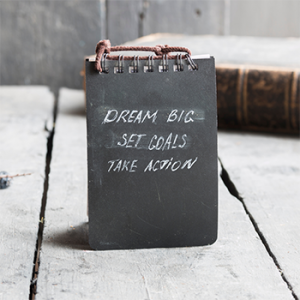Setting Healthy Goals for Yourself
 “This moment is a new point of beginning for me right here and right now.”—Louise Hay
“This moment is a new point of beginning for me right here and right now.”—Louise Hay
It’s the New Year and time for New Year’s resolutions. Our culture can encourage resolutions that are often lofty and unattainable. This can result in people feeling bad about themselves if they don’t meet an unrealistic goal.
At Boston Post Adoption Resources, we have some tips for setting healthy goals that we have found to be helpful all year-round.
BE S.M.A.R.T.
Let’s take a look at a popular model called S.M.A.R.T. Goal Setting. The acronym stands for:
Specific: Ask yourself questions and be specific: Include What, Where, Which, and Who questions. For example: What am I trying to accomplish? When do I want to achieve it? (For more, see Time-Bound). Who needs to be involved? Which obstacles may occur? Where will it happen?
Measurable: How can I measure this goal or know if I have met my goal?
Achievable: How realistic or attainable is this goal for me?
Relevant: Is this the right time for me to set this goal?
Time-bound: Is this goal realistic for the time frame? Is it a time-sensitive goal?
Newer S.M.A.R.T. models have included S.M.A.R.T.E.R, adding the E (evaluate) and the R (re-do) to accentuate the need for evaluation and flexibility in goal setting.
Potential Obstacles
Everyone is different, and this model may not work for you. Like many decisions in life, the important message is to think about potential costs and benefits. Ask yourself: How could setting this goal potentially benefit me or hurt me? As mental health therapists, we know that setting and meeting goals can increase confidence, build long-term visions and increase short-term motivation. At BPAR, we also understand the danger of falling into unrealistic goal setting, and how it can set us up to feel like a failure if a goal is not met.
A specific obstacle exists for individuals who are experiencing depression, as it can be extremely hard to initiate a goal. Sometimes we call this activation. This does not mean individuals who feel or are depressed lack motivation, but the mere initiation to get started on achieving a goal can be experienced as near impossible. It is very important to be aware of this obstacle when goal setting. Goal setting can also be challenging for individuals who struggle with executive functioning skills such as planning ahead. To avoid shame from unmet goals, Attitudemag.com suggests setting small, attainable goals with concrete rewards at the end. For instance, if you make it to those 10 yoga classes, treat yourself to the movies.
Self-Reflection
Goals are about what we want to change and the effort we are willing to put in. Ask yourself:
- How has goal setting worked for me in the past?
- When was I successful with setting a goal?
- And conversely, when did setting goals adversely impact me?
For example, I want to share something that has worked for me. I used to make long to-do lists, lists of all the things I needed to do. I was constantly feeling guilty and experienced building pressure the longer items stayed on the to-do list. When evaluating the list, I realized that many of the items were not time-bound or attainable, or sometimes even a relevant goal for me at that time! I started picking one thing a day and labeling it as either an “optional” or “crucial” goal. Introducing flexibility as well as making things very small, measurable and time-sensitive was an improvement. Remember to be kind to yourself in the process.
Being Mindful About Your Goal and the Process
When thinking about goal setting, it is also important to ask yourself what changes you are willing to make. Louise Hay writes about doing internal work to result in external changes. She writes, “Until you make the inner changes and are willing to do the mental work, nothing is going to change.” What is your “inner” work? Is it being aware of negative thoughts? Is it that you would like to let go of something? It’s important to think about your goals as long-term, not just New Year’s resolutions. This viewpoint allows us to have imperfect days and then re-evaluate and get back on the goal horse so to speak, using self-compassion when some days are harder than others.
Evaluate
Check in with yourself: How am I feeling about this goal? If it is feeling really hard, the calm.com Mindful Resolutions blog suggests considering modifying or scaling down the goal. After all, “A small goal met is better than a big goal abandoned (Additudemag.com).” This type of strategy can help us to let go of all-or-nothing thinking, i.e. if I didn’t do the goal perfectly, then I failed.
Share your goal with family and friends to help with accountability and to build social support. For individuals who struggle with executive functioning and future planning, employing the support of friends or coaches to achieve your goals as well as the aforementioned reward system may be particularly helpful.
Practice
Consider adding a daily ritual to help you think about your intentions and what you would like to change. Author Neil Pasricha talks about a daily meditation ritual in a recent podcast: Each morning breathe for two minutes, and say to yourself: 1) one thing I want to let go off today; 2) one thing I am grateful for today; and 3) one thing I want to focus on today. Really push yourself to think of specific things that you are grateful for.
Written by KC Craig
Boston Post Adoption Resources
References:
https://www.smartsheet.com/blog/essential-guide-writing-smart-goals
https://www.mindtools.com/page6.html
https://blog.calm.com/blog/mindful-resolutions
Trust Life. Love Yourself Every Day (2018). Hay House Publications.
Podcast: mindbodygreen, “How to be more resilient” with happiness expert Neil Pasricha